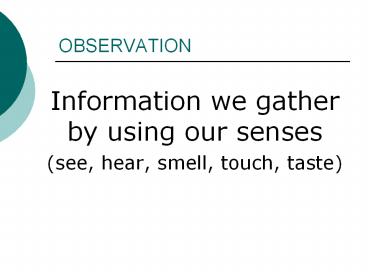OBSERVATION - PowerPoint PPT Presentation
1 / 26
Title: OBSERVATION
1
OBSERVATION
- Information we gather by using our senses
- (see, hear, smell, touch, taste)
2
A WORD OF CAUTION
- Although we may use all 5 senses to make
observations, you must NEVER taste or smell
unknown materials in science class!! - Unless the teacher specifically tells you to
taste or to smell something, DONT DO IT! - Safety is our first and most important concern in
science lab!
3
PROPERTY or ATTRIBUTE
- A characteristic that distinguishes one substance
from another - Examples color, size, shape, weight, odor,
taste, texture, sound - Observations should include as many attributes or
properties as possible
4
TWO KINDS OF OBSERVATIONS
- Qualitative Observations that do NOT involve
numbers or measurements. - Quantitative Observations that involve numbers
or measurements Remember N Number
5
INFERENCE
- A statement that explains or makes sense of an
observation
6
PREDICTION
- The outcome (or result) you expect to take place
in the future
7
HYPOTHESIS
- A prediction that can be tested by
- an experiment
- 3 Parts
- 1. Cause
- 2. Effect
- 3. Testable
8
Hypothesis
- Cause The ONE thing (variable) that is changed
in an experiment - Effect The results, the outcome, what happened
in the experiment - Testable Can be tested
9
Writing a Hypothesis
- Write a hypothesis as an IF., Then. statement
- If Cause
- Then Effect
- Example If I cool water to 0 degrees Celsius,
then the water will freeze.
10
Identify the cause and the effect
- The higher the temperature of the water, the
faster the eggs will cook. - People who drink fluoridated water will have less
tooth decay than those who dont - Refrigeration will slow the growth of mold on
bread.
11
Identify the Cause and the Effect
- Talking to plants will make them grow taller.
- When soil is wet, it weighs less than when it is
dry. - Putting a metal object in the outlet will shock
you. - If you put wet clothes in your clothes hamper and
leave them there until laundry day, mold will
grow on them.
12
Writing a Hypothesis- If Then
- If the temperature of the water is higher, then
the eggs will cook faster. - If people drink fluoridated water, then they will
have less tooth decay than those who dont. - If bread is refrigerated, then the refrigeration
will slow the growth of mold on the bread.
13
Writing a Hypothesis- If Then
- If you talk to plants, then the plants will grow
taller. - If soil is wet, then it will weigh less than soil
that is dry. - If you put a metal object in the outlet, then it
will shock you. - If you put wet clothes in your clothes hamper and
leave them there until laundry day, then mold
will grow on them.
14
Controlled Experiment
- An experiment where only one variable is changed.
- All other variables are controlled, or kept the
same. - Only CONTROLLED experiments are FAIR and
RELIABLE!!!
15
VARIABLE
- A factor that can affect the outcome of an
experiment - It is IMPORTANT to keep all but ONE of the
variables the same in different trials of the
experiment
16
The Control
- The part of the experiment that does NOT receive
the change to the variable. - At the end of an experiment, we compare our
results to the CONTROL to see the change more
clearly
17
SCIENTIFIC METHOD
- A way of thinking about nature that involves the
use of certain skills to solve problems in an
orderly manner. - SOLVE PROBLEMS ORDERLY MANNER
18
7 Step Scientific Method
- Ask a question/define problem
- Gather background information
- Form a hypothesis
- Test hypothesis w/an experiment
- Make observations and record data (take notes)
- Analyze data
- Draw a conclusion
19
Define The Problem
- State the problem as a CLEARLY worded QUESTION
20
Gather Background Information
- Collect any information related to the question
you are trying to answer. - Make as many qualitative and quantitative
observations as you can before the experiment!!!
21
Form the HYPOTHESIS
- Write the BEST POSSIBLE answer that you can think
of to the question. - Be sure to include a CAUSE and an EFFECT!!!!
- Write it as an If Then Statement.
- Remember, you have to be able to test your
hypothesis!!
22
Test the Hypothesis
- Perform an experiment designed to test your
answer to the investigative question - When performing an experiment
- Make certain that you and those in your group are
being accurate in what you observe and measure. - If something does not make sense with the other
data, then RETEST the conflicting data!
23
Make Observations
- During the experiment, make as many qualitative
and quantitative observations as you can!! - Remember to
- Make sure to pay attention to any changes that
occur during the experiment. - Make sure your measurements are always as
accurate as possible.
24
Analyze Data
- When studying your data from an experiment, be
sure to look for relationships. - Ask yourself these questions
- Is there a relationship?
- Is there a pattern?
25
Draw Conclusions
- After analyzing the data, summarize the results
of the experiment. - The conclusion should answer the investigative
question. - Example
- Question-Which ball will bounce the
- highest?
- Conclusion-The golf ball bounced the
highest.
26
Communicate Results
- When sharing the results of an experiment, be
clear and concise in the information your group
presents to the class. - Share the relationships or lack of relationships
(anomalies) that are found in the results of the
experiment.































